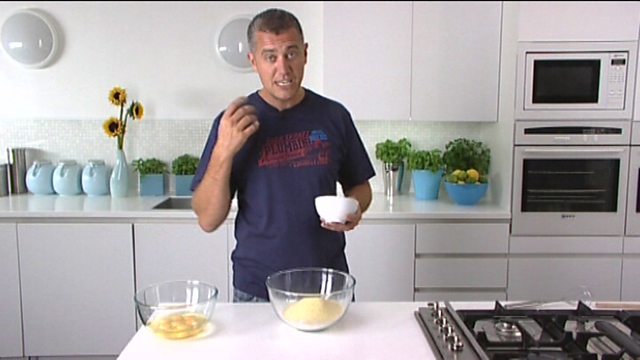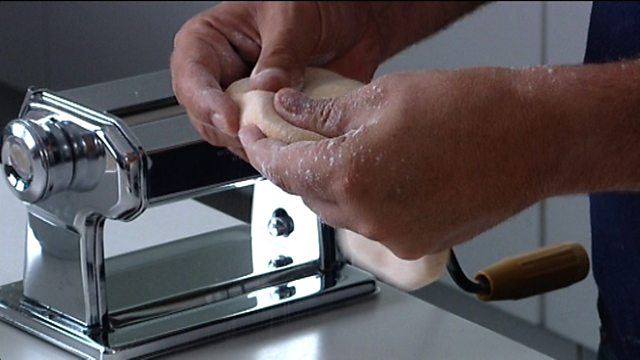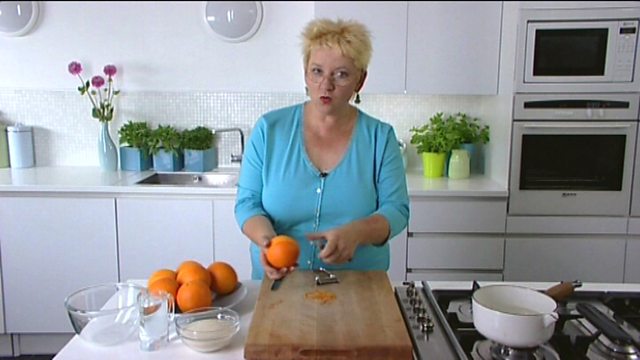Preparation time
over 2 hours
Cooking time
10 to 30 mins
Serves
Serves 4
Recommended by
2 people
Dietary
NB: For this recipe you will need a pasta machine.

For the ravioli, in a bowl, beat together the eggs and egg yolks until well combined.
Pour the flour into the bowl of a food processor. With the motor running, slowly add the beaten eggs in a thin stream until the mixture comes together as a smooth dough. If the mixture appears too dry, add a few drops of water.
Wrap the pasta dough in cling film and chill in the fridge for at least an hour.
When the pasta dough has chilled, turn it out onto a work surface liberally scattered with very fine semolina. Knead the dough by pushing it away with the heel of your hand, then folding it back towards you. Turn the folded dough by 90 degrees and repeat the process. Continue to knead in this way for 1-2 minutes, or until the dough is smooth with a slight sheen. Cover the dough with cling film again and chill in the fridge for another hour.
Meanwhile, for the ricotta and herb filling, heat a frying pan over a medium heat. Add the pine nuts and dry fry, stirring continuously, for 1-2 minutes, or until golden-brown.
Transfer the toasted pine nuts to a large mixing bowl, then add the ricotta, grated parmesan, herbs and lemon zest. Season, to taste, with salt and freshly ground black pepper, then cover and set aside until needed.
For the garlic oil, warm the olive oil in a pan over a low to medium heat. Turn off the heat, leaving the pan on the residual heat. Add the garlic, stir and leave over the residual heat until needed.
For the ravioli, turn out the chilled pasta dough onto a work surface liberally scattered with fine semolina. Cut the pasta dough into four pieces.
Using your hands, flatten one of the pieces of pasta dough. Set the pasta machine to its widest (thickest) setting and gently feed the first piece of pasta through the pasta machine to create a long flat sheet. Fold the pasta sheet in half.
Change the setting of the pasta machine to the next-thickest setting and feed the pasta sheet through the machine again, folded edge first.
Repeat this process, gradually feeding the pasta through thinner and thinner settings until you get to the thinnest setting. (NB: If the dough becomes too long to handle at any point, cut it in half and continue folding and rolling. If it becomes too sticky, dust with a little fine semolina.)
Lay the pasta sheet onto a work surface lightly dusted with fine semolina. Starting 2.5cm/1in from the end of the sheet, place two teaspoonfuls of the ricotta and herb filling mixture just before the mid-point of the pasta sheet.
Repeat the process, placing each portion of filling mixture 4cm/1½in from the last. (NB: The last portion of filling mixture should be placed at least 2.5cm/1in from the edge of the pasta sheet.)
Brush a little cold water around each portion of filling mixture, then fold the empty half of the dough over the bottom to cover completely.
Using a sharp knife or a pastry wheel, cut between the mounds to leave each raviolo with a neat 0.5cm border. Working from one side of each raviolo to the other, pinch the edges of the dough together, forcing out any air bubbles.
Place the ravioli onto a large tray dusted with fine semolina. Cover with cling film until needed.
Repeat the process with the remaining pasta dough and the remaining filling mixture until all of the pasta and filling have been used up.
Bring a very large saucepan of salted water to the boil. Carefully lower the ravioli into the pan, in batches, then return the water to the boil. Cook for 2-3 minutes, or until the ravioli pasta is al dente. Drain the ravioli well and transfer to a warmed serving bowl.
Meanwhile, warm the garlic oil gently over a low to medium heat. Drizzle it over the ravioli, then season, to taste, with freshly ground black pepper and mix carefully to combine. Sprinkle over the remaining parmesan. Serve immediately.

You need JavaScript to view this clip.

You need JavaScript to view this clip.

You need JavaScript to view this clip.